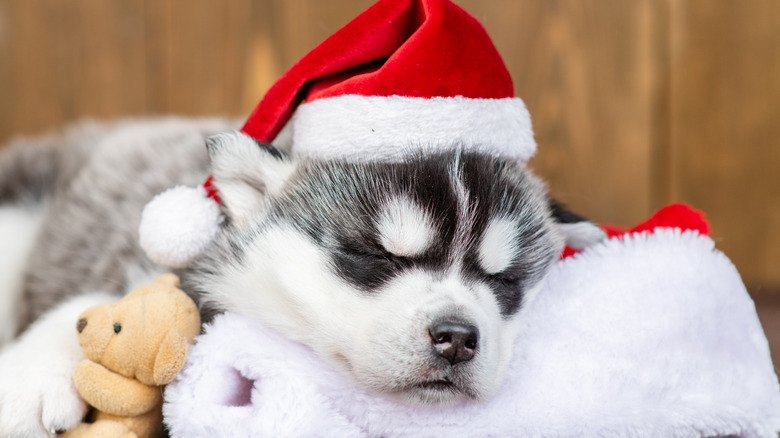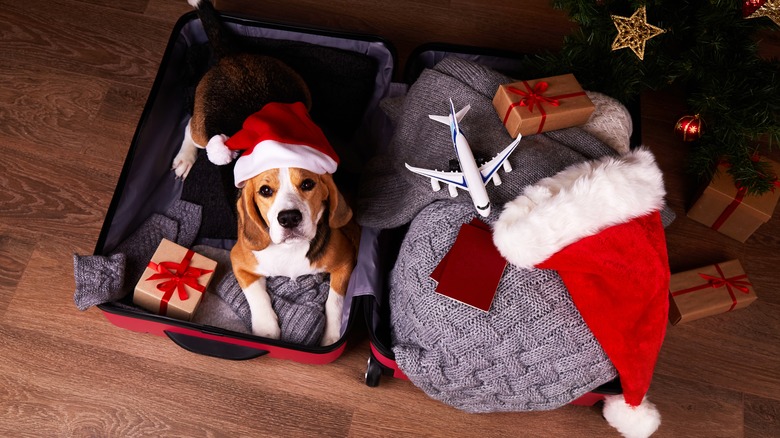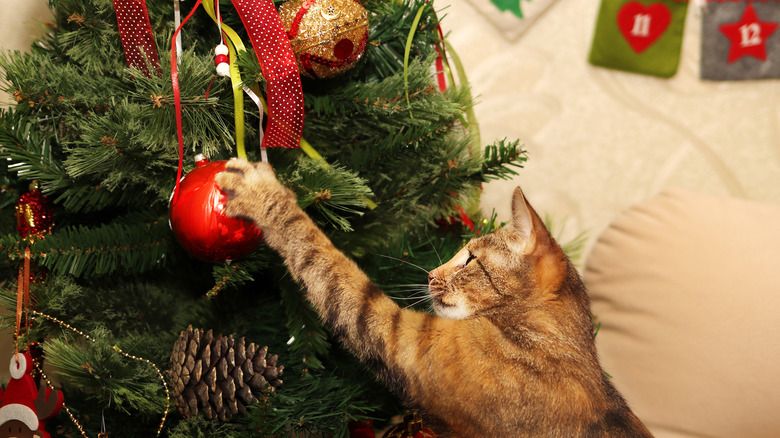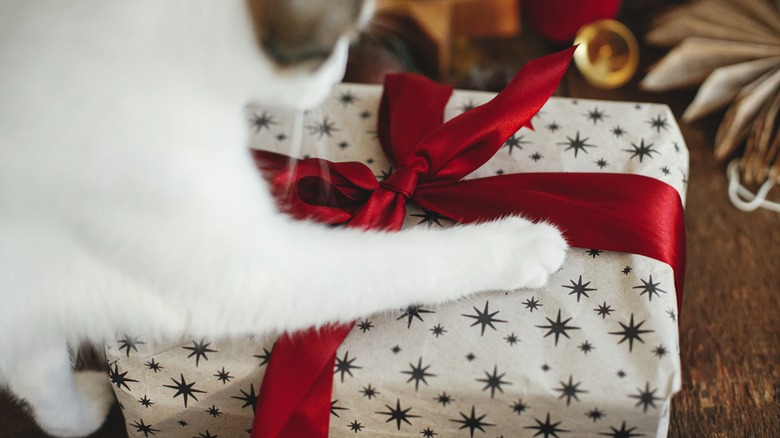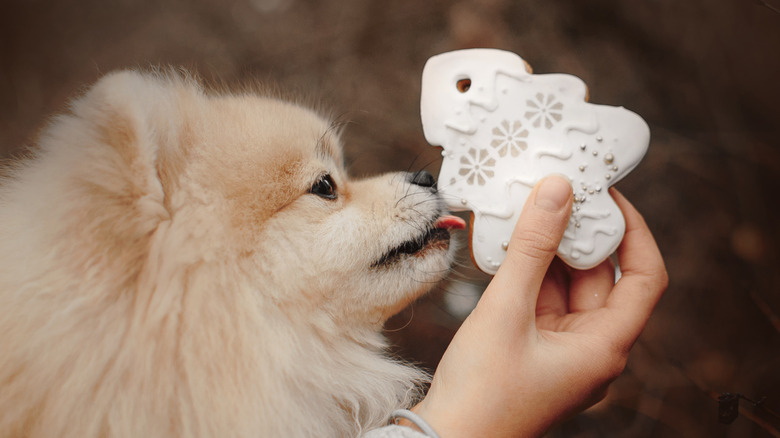How To Keep Your Pets Safe This Holiday Season
The winter holidays, whether you'll be celebrating Christmas, Yule, Hanukkah, Kwanzaa, or any combination thereof, are all about spending time with family and loved ones. Of course, our furry friends are part of this! While Fluffy and Fang may not appreciate being dressed up in reindeer horns and jingle-bell collars, they undoubtedly enjoy a few extra treats and some toys in their stockings. According to data compiled by YouGov, in 2019, 31% of Americans planned to buy a gift for their pet (bear in mind, not all poll respondents were pet owners), which is a significantly higher number than the 13% who planned to gift their coworkers. (In their defense, pets bring us joy year-round. Cubicle mates, not necessarily.)
If you really want to give your pet something special, though, the best present of all -– besides your kisses, snuggles, and just a tiny bite of that yummy sandwich you're eating — is the gift of health and safety. Holidays can be a stressful time for pets, and all of the decorations and even those delicious holiday goodies can pose quite a danger to adventurous (or merely opportunistic) pups and kitties. As you start decking those halls, take some time to pet-proof your home for the holidays, as well.
Make pet-friendly travel plans
While there may be no place like home for the holidays, that "home" we're heading for may be someone else's. Should you be hitting the road –- or not-so-friendly skies — with pets in tow, Dr. Amber Karwacki of Heart + Paw tells The List that precautions should be taken. "Make sure your furry family member is wearing a tag with up to date information like phone numbers and address, and that their microchip information is current," she says. If your vet has prescribed meds to prevent your pet from getting carsick or over-anxious, make sure to get that prescription filled well in advance. As Dr. Karwacki cautions, "Waiting until the day before travel might mean your pet has to go without their medication."
Dr. Karwacki also suggests that if your pet is likely to get stressed out by traveling, it might be better to board them instead. You could also try to find a good in-home sitter, but you'll have to act early, as holidays may be a busy time for both pet sitters and boarding kennels. Should you absolutely have to travel with pets in tow, make sure that you've got pet-friendly accommodations waiting for you at the end of the road. If the family or friends you're visiting aren't anxious to have your animals around the house, you may need to find accommodations that take pets, but be sure to check the pet policy for restrictions on size, number, and type.
Avoid dangerous decorations
If your holiday décor involves any live or recently-deceased plants such as poinsettias, mistletoe, holly, or pine trees, you might want to re-think this, or at least take precautions. Poinsettias are extremely toxic, as are mistletoe and holly berries. As Dr. Karwacki advises, "If you think that your pet might have gotten hold of one of these plants, it is important to contact your veterinarian immediately." She suggests you might want to use silk plants instead of real ones. A real tree isn't too dangerous in and of itself, but she does note that you should try to prevent your pets from drinking the water out of the tree base, since it might contain nasty chemicals or bacteria.
As far as your Christmas tree goes, whether it's real or artificial, watch that it doesn't tip over onto your pets if they get the zoomies and crash into it or even try to climb it. You could secure the tree, as Dr. Karwacki advises, or set up a pet gate around it, as per Chewy. This latter precaution may also help keep pets from potentially dangerous decorations like glass items, as well as the lights on the tree. As Dr. Karwacki says of the latter, "Watch that your pet is not chewing on the electrical cords," explaining, "While the cords are not strong enough to electrocute your pet, they can give your pet a thermal burn in their mouth."
Wrap your presents with care
Wrapping paper, ribbons, and bows can all be dangerous to pets. The Vitus Vet blog notes that wrapping paper can contain harmful chemicals, while the Veterinary Teaching Hospital at the University of Washington explains that ribbons, as well as tinsel, are particularly hazardous. If anything string-like is swallowed, it can wind up causing serious harm to a pet's intestines. Should you plan to pile up gifts under the tree where pets can reach them, look for natural, "green" wrapping paper printed with non-toxic ink and skip the ribbons and other potentially hazardous adornments. Also, it's best not to leave out any presents that contain edible items as they're likely to be unwrapped early — and not necessarily by the intended recipient.
Dr. Karwacki points out that you'll also need to exercise caution even after the gifts have been unwrapped. While it's never fun to have your pets get into the trash cans, it does happen, leaving you with a not-so-festive mess to clean up. If the mess should contain the aforementioned paper, ribbons, and tinsel (as well as bones or other potentially hazardous foodstuffs), then you could have a serious problem in the making. As Dr. Karwacki advises, "Always make sure that ... any trash has been disposed of properly in a trash bag that is not accessible to pets."
Not all goodies are good for your pet
Not only can holiday tinsel and trappings be risky for your pets, but holiday foods present a plethora of perils. Anything chocolate is right out, as are candies sweetened with xylitol. Raisins, too, are terrible for dogs, so no matter how much you want to get out of eating that slice of fruitcake, under no circumstances should you slip it to your canine companion. The Pet Poison Helpline says that the raisins, currants, and grapes that fruitcakes often contain can cause kidney failure in dogs, and if the fruitcake is laced with alcohol, this can lead to ethanol intoxication. In fact, the ASPCA says to keep eggnog and other cocktails far away from your fur friends, since alcohol can actually be deadly for pets.
If you're having a turkey for your holiday dinner, the bones are a choking or splintering hazard for pets, but even a boneless ham has its own danger. As per the University of Washington's Veterinary Teaching Hospital, ham, sausage, roast duck, or any other highly fatty foods can lead to pet pancreatitis. If you'd like to share your holiday meal, Billings Animal Family Hospital suggests pumpkin, green beans, and apples as pet-friendly nibbles. You can also treat your pets with safe holiday yummies such as Santa or reindeer-shaped biscuits or chewies, or even leave a plate out for Santa Paws loaded with homemade pet treats (check out the recipes from The Dog People).
